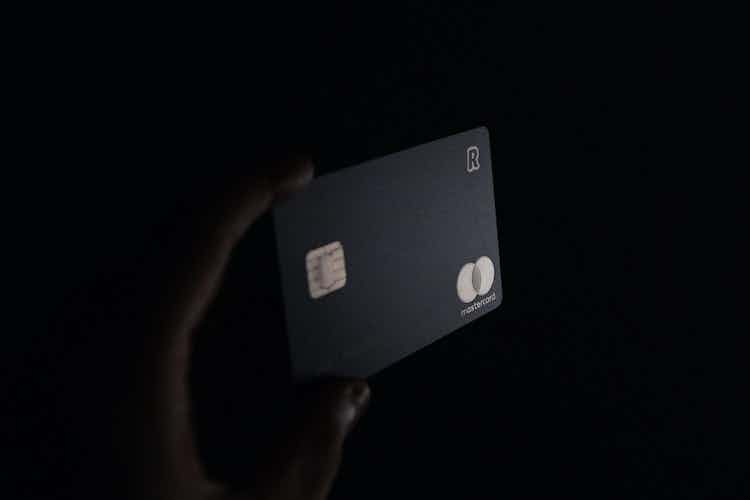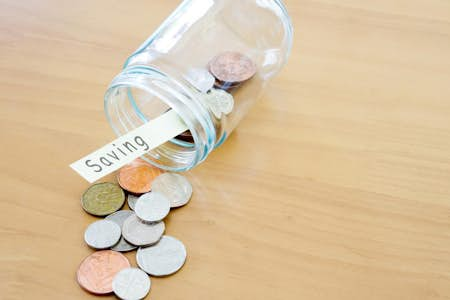Giving children money is a step toward providing them with more independence, but it also has a safety aspect to it. You need to give children money at some point in their lives so they can purchase things when they're out without you or their parents. For instance, if they're out with friends, they may need to buy lunch or a bus ticket home.
Previously, you may have given them pocket money by giving them physical cash. But that comes with its pitfalls, so opening them a current account with a debit card could be a better alternative.
Save for your grandchildren's future by checking out the UK's leading Junior ISA providers now.
What’s wrong with just pocket money?
It can be tempting to stick to just giving them cash, particularly as a grandparent. It's likely what you got and presumably how you gave your children their pocket money, too. If it worked then, why do you need to reinvent the wheel now and start using a bank account with a debit card that will also come with a snazzy app?
While receiving a £5 note from grandparents is always gratefully received by grandchildren, there are several problems with giving pocket money in this way. Firstly, you actually have to have the cash on you. In the past, when you used more cash, you may well have had it on your person. However, now, with so many of us just using our cards or phone to buy things, you are less likely to have the money in your purse or wallet.
Additionally, you physically have to be with your grandchild to give them the money. But what if you don't live close enough to see them regularly? Or what if you don't see them for a few weeks? What happens to their pocket money then?
Finally, hard cash, especially for younger children, is incredibly easy to lose. So there is a higher potential for it going astray if you don't transfer it to their bank account.
Advantages to opening a current account
Given the pitfalls of giving pocket money the old-fashioned way, you could open a current account for your child and pay them their cash that way. However, if you're not keen on them having an actual account, you can use one of the new products that link to an app a child has to your account. These products often come with prepaid debit cards, which you can top up through a transfer from your phone.
Money management
Budgeting and good money habits can hugely benefit a person throughout their life. What's great about opening a current account and the newer style pocket money apps is that they record what they have spent their money on. It means they can start to learn financial responsibility for their own money.
Ease
Transferring money is far easier than going to a cash machine and ensuring you have the exact right amount so you can give your grandchild their pocket money. Plus, through transfers, you can always ensure your grandchild has the cash to get home safely or buy items they require at school or when out with friends. You can also set up regular payments, so you don't even have to remember to transfer pocket money every month.
Control
While they start to feel more responsible for their own money, more in control of their lives, and more independent, you can still have much control over what they do. For example, new style banking products for kids often ensure they can't spend all their money in one day or all in one shop.
Best kids bank accounts with a debit card
The following possibilities for debit card accounts are not full-on bank accounts. Instead, they're apps with a prepaid debit card linked to your account. You can transfer funds to the debit card, which your grandchild can keep track of on their app. It means that you can still have a lot of control over a child's finances while they have a lot of choice and freedom over what they can spend their money on.
GoHenry
GoHenry is a wonderful app that has some fantastic features. Kids will love to use it, and the slick, well-designed app is straightforward to use. One of its most loved features is its customisable debit card which kids will love to have stashed in their wallets.
Revolut Junior/Revolut <18
While Revolut isn't a bank, its foray into kids' financial products offers you the ability to set them up with an app that has other uses for you too. For example, you can take advantage of various features and benefits available via the "adult" Revolut app and service.
Nimbl
Nimbl has many fantastic features that make it an option when comparing the market. In addition, it's competitively priced with an app that works efficiently and effectively for all that use it.
Rooster Money
Rooster is a great app that offers kids many fun features that will help them become financially literate in no time. In addition, it provides you all the ease and peace of mind that these apps should give as standard while your grandchild has the chance to manage their own money.
Features for a kids account
Opening an account these days is rarely about going in-store, going to a window and receiving excellent customer service. Instead, it's about technology and how it can provide unique features to you and your grandchild as an account holder.
Many features you would want for your own account will be what you want for a teen or child account, but you'll likely want to see the below specifically before choosing which bank to use for your grandchildren.
Mobile banking app
Having a pocket money app is crucial in our day and age. As we increasingly use apps and technology in every part of our lives, having one to help manage a child's money is just one example of how it can make lives easier. Plus, pocket money apps are an interactive way to get children involved in money management.
Many of them include financial education quizzes and tools too. It means your child can learn to be financially literate without needing too much input from you.
Contactless debit card
A prepaid debit card is a common feature of children's bank accounts or banking-style apps. And quite rightly too. It offers them a great deal of financial freedom, making them feel more responsible and independent of you, with a level of control in place for you and their parents.
They can't go into an overdraft using a prepaid cash card as they won't be able to buy anything for which they have insufficient funds. Plus, they can only withdraw money from their account if they have enough in it when they use an ATM.
Online banking
Buying things online and being able to transfer funds themselves is an element of these bank account style products that help make life easier for them. So if they're out with friends, splitting the bill for something, or owe a mate money, they can easily do so through the app on their phone. Therefore, they can use the electronic advantages of online banking while keeping an eye on their spending.
Text alerts
You can get notifications and text alerts if you need them. So you know when your grandchild makes a purchase or their funds are running low. That's a brilliant feature; it means you don't have to remember to check for these things. Instead, you get notifications when necessary, making your life much easier and less stressful.
Spending limits
Another essential feature a child account should have is the ability for you or their parents to set spending limits. While they may not intend to overspend, as they are still so young, they may not quite have the financial know-how to budget property. Plus, sometimes kids get obsessions with things, like Minecraft, for instance, where they can easily keep buying something, not realising the financial implications.
You can prevent that by setting spending limits on accounts - stipulating how much they can spend in one store or on a given day.
Savings goals
You and your grandchild can set savings goals to work towards amassing a certain amount of money. For example, they may want to save towards buying a high-value item, or you could reward them if they save a certain amount of cash. They learn the benefits of putting money aside in this way, which is a great way to educate them for the future.
Round up
Not all kids' products will offer this, but some do have a round-up feature. They work by rounding up an item's purchase price to the nearest pound. So if a child buys a magazine for £6.59 at a newsagent on their prepaid card, the app will round it up to £7 and put the 41p into a savings pot. It means they can work towards savings goals when they make a purchase.
Cash machines
While cash is being used less frequently by society, particularly with younger generations, there are instances where it is required. Ensuring your chosen account product for your grandchild allows them to take money out of an ATM is vital. Not all will, yet it's an excellent feature should there be times when they need to pay for items or services with physical cash.
Alternatives to Children’s bank account product
If, upon reading the above features and examples of banking products for kids, you realise that they're different from what you want, here are some alternatives.
Savings account
You can open up a savings account for your child, which will pay an interest rate on whatever you put in. You'll be told the gross rate or AER when you open the account, and that's what funds will earn over the year. If you don't want your grandchild to spend the money you give them but instead want to save for their future, this could be a good option for you.
ISA
You can ask the child's parents or legal guardian to open a Junior ISA for your grandchild, with both Cash ISAs and Stocks and Shares ISAs an option. You can pay up to £9,000 a year into a child's ISA - whichever sort you choose.
Cash ISAs work similarly to a savings account, earning the interest rate advertised by the provider. A stocks and shares ISA is where you can invest money for your child in funds, bonds or companies in the hope of making a return. That return has the potential to be much higher than any return made on a cash ISA.
Your child won't have to pay income tax on any earnings or growth with either product.
Opening a bank account for a child
If you want to open an actual bank account for a child versus a product linked to your account, you'll likely need a birth certificate and proof of address. You'll also need to prove that you are a parent, guardian, or grandparent if the bank or entity allows grandparents to do this.
The process shouldn't be complicated, but if you open a fully-fledged bank account for them, make sure it is with a financial institution covered under the Financial Services Compensation Scheme (FSCS) so that all monies are protected should your bank or building society fail.
Before you open a kids' bank account
Finally, several things are worth checking before you open any kids' bank account or savings product. One would be to review any fee information document to be aware of any monthly fees you must pay.
Plus, ensure you know the number of withdrawals you can make a year without any charge - this is particularly important if you are setting up a savings account.
Then, ensure that no overdraft facility exists on any kids' account - unless you want them to have one.







